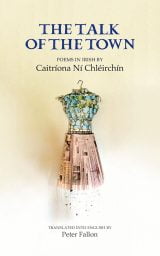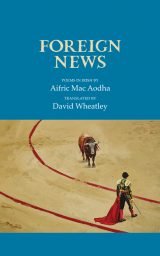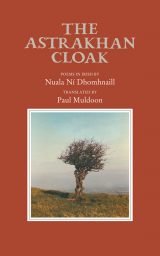Ailbhe Ní Ghearbhuigh’s poems in Irish have been lavished with plaudits and prizes. They blend dreams and dread visions. Collapsing ages and traditions, banshees and pookas infiltrate a modern, urban sensibility. Loss and longing co-exist in sensual images and expressions. The Coast Road, from named places — Galway and Harlem, Antarctica and Kilmalkedar — to imagined states, including ‘the madhouse behind the moon’, is a book of uncommon range and searing effect.
Among its themes are language and languages, their failure and throes, and silence too. In its variety of responses the book may be read as a guide to the possibilities of translation itself. In it, some of Ireland’s finest poets gather to spread the word and introduce a vital voice to a wider audience.
Selected poems in Irish with translations into English by Michael Coady • Peter Fallon • Tom French • Alan Gillis • Vona Groarke • John McAuliffe • Medbh McGuckian • Paul Muldoon • Michelle O’Sullivan • Justin Quinn • Billy Ramsell • Peter Sirr • David Wheatley
‘This book is a selection, with translations by many hands, from Ailbhe Ní Ghearbhuigh’s previous two collections in Irish, Péacadh and Tost agus Allagar, both published by Coiscéim Press. It is a feast for the eye and the ear and a consolation for the heart. With its excellent, and occasionally multiple, translations, it is also a great example of what can be achieved by the coming together of the two great languages to which this island is heir.’ — Nuala Ní Dhomhnaill, The Irish Times
Raiders and Settlers
The Coast Road is a landmark publication in the literary career of Ailbhe Ní Ghearbhuigh. It brings together a selection of poems previously published by Coiscéim: Péacadh (Germination) (2008) and Tost agus Allagar (Silence and Disputation) (2016) in a single volume issued by Gallery Press. In keeping with the traditions of a bilingual format, the original poems figure on the left-hand page and the translations on the right. Two poems benefit from a double-translation: “Bóin Dé”, translated twice by Justin Quinn, and “Irrintzina”, rendered in English by both Peter Sirr and Billy Ramsell.
Ailbhe Ní Ghearbhuigh’s poetry, cosseted and curated within the pages of a Gallery volume, is a lovely thing. We witness the variety of her compositional talent. Her poems move between the traditional and the modern, drawing inspiration from the Irish language tradition, with a poem such as “Mac a Leanna”, and its nod to “Bean a Leanna”, or again in “Ceathrúintí na n-Éan”, a poem which echoes “Ceathrúintí Mháire Ní Ógáin”, the plaintive poem of disillusionment written by Máire Mhac an tSaoi. Yet “Ceathrúintí na n-Éan” also manages to summon up Nuala Ní Dhomhnaill’s versatile mer-women via Ní Ghearbhuigh’s swan-woman (éan-bhean), while reminding us also of the legend of the Children of Lir. The lines are filled with powerful assonances, and chillingly violent images, that both fascinate and horrify the reader. Ní Ghearbhuigh is also keen to ensure that the language is large enough to encompass jazz, New York, the French tongue, and, in a poem like the award-winning “Deireadh na Feide”, she reminds us of the fragility of the language in which she chooses to make her literary life.
Ailbhe Ní Ghearbhuigh’s poems have been transported into English by no fewer than thirteen translators. One, Michael Coady, translates a single poem (“Eye of the Needle”). Others, like Peter Fallon, Alan Gillis, Billy Ramsell and David Wheatley, translate five poems each. There are also translations by women poets — Vona Groarke, Medbh McGuckian and Michelle O’Sullivan. Lurking in the background, with two translations to his name, is Paul Muldoon, conveyor par excellence into English of the poems of Nuala Ní Dhomhnaill. Such a variety of voices invites invidious comparisons. By what yardstick should one measure the translations? Should one invoke that hoary old chestnut that torments all reviewers of poetry in translation: how faithful are the poet-translators (the category is vital here) to the poetic voice of Ní Ghearbhuigh? Can they be classified as “raiders” or “settlers”, to borrow Seamus Heaney’s terminology?
The strength of the volume lies in the absence of a definitive response. The poets do as they please, and adopt the strategy that suits their purpose. This laissez-faire approach is exemplified in Justin Quinn’s double translation of “Bóin Dé”. The first “Ladybird” is a respectful copy of the original. It follows the syntax and poetic structure of Ní Ghearbhuigh’s three-line stanzas, coaxing the readers back to the Irish originals, lip-reading the other language with us, and for us, in an agreeable and entirely successful companionship. The second “Ladybird”, however, has taken flight, in what Ciaran Carson has termed a “fetch”. The poem is compressed within the walls of the sonnet and it flutters enchantingly, in a display of virtuoso end-rhymes, showing nonetheless that the bóin dé has kept her spots in this linguistic operation.
Michelle O’Sullivan’s approach to the translation is one of compression. In “Bee-keeper” she distils the elongated original into a glassy sonnet-like structure. The isolated final line reminds us that the buzz of the original may not always be heard though the glass of translation. Alan Gillis is brave enough to reproduce the villanelle of “Grasse Matinée” in a very accomplished version of the original; although the feminine rhymes in “-aste” in English lack the satisfying orotundity of the Irish rhymes in “-all”.
David Wheatley’s sprightly translations capture the essential whimsy of a poem like “Ionsaí na Bé”. Both the poem and its translation strike the reader as an intellectual gambol through the territory inhabited by that other poetic duo of poet and translator, Nuala Ní Dhomhnaill and Paul Muldoon, in a poem like “An Crann”/“As for the Quince”. “Ionsaí na Bé” is gleeful in its evocation of the fairies, and Wheatley’s accompanying “bucklepping” across the linguistic barriers captures the playfulness of the poem. And of course there is Muldoon himself, who in “Emigrant” chooses to erase the Hispanic identity of the migrant of the original poem, Englishing the two Spanish lines into a jaunty rhyming couplet, with a neat winning rhyme on “enough” and “muff”.
Such a publication as The Coast Road also raises the issue of the translational gesture of storage; the well-mannered curing of the corncrake (to quote Biddy Jenkinson) and its pickling into English, the language which Pascale Casanova has termed the all-encroaching langue mondiale. Yet the approach adopted in this volume, with its multiple translators, ensures that no one voices substitutes itself for the voice of the poet, no one translator drowns out the original. The interval between the publication of the volumes in Irish and the translations has allowed the work to be heard in its own time, with its own lilt, on its own frequency. Peter Fallon is be commended for reminding the English-language public that Irish-language poetry continues to talk back, obdurately, enduringly, enchantingly, as we can see in the very successful enterprise that is The Coast Road.
— Clíona Ní Ríordáin, Dublin Review of Books
A Playful and Witty Bilingual Feast
Her translators echo the wit and playfulness of the Irish-language poet’s originals
This book is a selection, with translations by many hands, from Ailbhe Ní Ghearbhuigh’s previous two collections in Irish, Péacadh and Tost agus Allagar, both published by Coiscéim Press. It is a feast for the eye and the ear and a consolation for the heart. With its excellent, and occasionally multiple, translations, it is also a great example of what can be achieved by the coming together of the two great languages to which this island is heir.
Naturally for a poet writing in Irish, like all poets writing in lesser-spoken languages, Ní Ghearbhuigh has her bad days:
Bím bréan do bheith fréamhaithe
cois leapan
na teangan éignithe seo,
ag guí biseach uirthi,
á faireadh go cúramach
ag impí beatha inti arís.
(. . . worn out
from being tied
to this jaded
language’s bedside,
down on my knees
praying she’ll thrive,
tending to her, imploring
she’ll show signs of being alive)
But it is typical of her wide scope and breadth of vision that this existential worry is widened out to include other endangered languages, such as “Irrintzina, a shrieking language in the Basque country used to express emotion”. Probably the most plaintive case of all is a whistling language formerly used by shepherds in the Pyrenees. This language was used against the Nazis to stop Jews from coming to harm and it passed resistance messages
secretly, from lip to pursed lip,
and helped crashed allied pilots
reach the border with Spain.
Unfortunately for posterity and the sum total of human culture, this language
. . . hasn’t been heard since.
It has a half-life, this whistling language,
in the memories of certain parishioners
but none now is capable
of producing the sounds.
It has never been recorded.
The message is obvious. It is enough to raise the small hairs on the back of the neck of any of us working in Irish. But for me the real merit of this poem is in the title, ‘Deireadh na Feide’. This is because of the phrase “i ndeireadh na feide”, translated in Dinneen’s dictionary as “at the last gasp” or, as I would prefer to put it, “at wit’s end”. Literally, though, it means “at the end of the whistle”, and this title, with its punning wit, lifts the whole poem with a lightness that wonderfully moderates what might otherwise be too portentous a meaning.
This wit and playfulness with language is obvious throughout the whole collection. It pervades many of the original poems, such as ‘Manach Eile agus a Chat’, with its knowing nod to the famous ‘Pangur Bán’, and any amount of others into which famous lines from the literary and singing tradition have been slyly snuck; lines such as “faoiseamh a gheobhadsa”, “mo ghrá go daingean thú”, “rúmanna á mbreacadh aici” and “bheadh agat féirín lá aonaigh / is margaidh”.
The poems work fine without knowledge of the literary pedigree of such lines. However, for anyone who has more than a passing acquaintance with the Irish literary and song tradition they are an added enjoyment, giving depth and resonance to the poems.
The bevy of translators do a marvellous job, but I would single out two poems in particular translated by Alan Gillis, ‘Rented’ and ‘Grasse Matinée’, for the excellent way he uses end-rhyme in English to approximate the long vowels, diphthongs and assonances of the original. This last-mentioned poem is my very favourite in the whole book. It is fresh and original. It is full of the elan and sensuousness of youth. It manages to make an intense aesthetic experience out of the very thought of eating oranges later on.
Once again, Peter Fallon has produced a classy and important book, a book of which it can be said that the whole is greater than the parts. I am delighted that the talents of Ailbhe Ní Ghearbhuigh have been done poetic justice.
— Nuala Ní Dhomhnaill, The Irish Times





